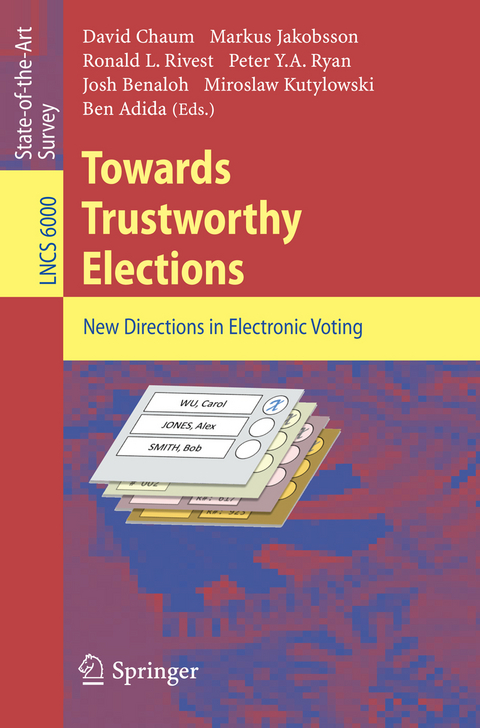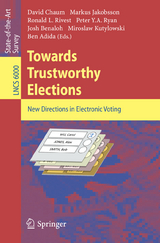Towards Trustworthy Elections
Springer Berlin (Verlag)
9783642129797 (ISBN)
For many years now, cryptography has been keeping messages secure for senders, irrespective of the routing to the destination. This same technology can be used to keep votes secure for voters, from the casting of the vote all the way through to the inclusion of the vote in the final tally.This state-of-the-art survey addresses the challenges faced in establishing a trustworthy electronic voting system. The 24 contributions included in the volume were carefully reviewed and selected from the presentations given during a series of workshops on trustworthy elections held over the last decade. Topics addresses range from foundational and theoretical aspects to algorithms and systems issues, as well as applications in various fields.
Ronald L. Rivest ist Professor für Elektrotechnik und Informatik am Massachusetts Institute of Technology (MIT) in Cambridge, Massachusetts, USA. Er arbeitet im Labor für Informatik und Künstliche Intelligenz (Computer Science and Artificial Intelligence Laboratory, CSAIL) und ist unter anderem Gründer der Gruppe Kryptographie und Informationssicherheit (Cryptography and Information Security Group). Seine Forschungsschwerpunkte liegen auf Kryptographie, Computer- und Netzwerksicherheit, elektronischer Abstimmung/Wahl und Algorithmen. Er ist ferner Mitbegründer der RSA Security Inc., einer weltweit agierenden Firma im Bereich Schutz von Online-Identitäten und digitalen Vermögenswerten sowie von Peppercoin, einem Anbieter von Finanzdienstleistungen.
The Witness-Voting System.- Coercion-Resistant Electronic Elections.- Receipt-Free K-out-of-L Voting Based on ElGamal Encryption.- A Secure Architecture for Voting Electronically (SAVE).- A Modular Voting Architecture ("Frog Voting").- Unconditionally Secure Electronic Voting.- Electronic Elections: A Balancing Act.- An Implementation of a Mix-Net Based Network Voting Scheme and Its Use in a Private Organization.- The Vector-Ballot Approach for Online Voting Procedures.- On Optical Mark-Sense Scanning.- On Some Incompatible Properties of Voting Schemes.- A Threat Analysis of Prêt à Voter.- Anonymity in Voting Revisited.- Anonymous One-Time Broadcast Using Non-interactive Dining Cryptographer Nets with Applications to Voting.- An Introduction to PunchScan.- Component Based Electronic Voting Systems.- A Verifiable Voting Protocol Based on Farnel.- Verifying Privacy-Type Properties of Electronic Voting Protocols: A Taster.- Improving Remote Voting Security with CodeVoting.- A Practical and Secure Coercion-Resistant Scheme for Internet Voting.- Scratch, Click & Vote: E2E Voting over the Internet.- Securing Optical-Scan Voting.- Attacking Paper-Based E2E Voting Systems.- Aperio: High Integrity Elections for Developing Countries.
| Erscheint lt. Verlag | 9.6.2010 |
|---|---|
| Reihe/Serie | Lecture Notes in Computer Science | Security and Cryptology |
| Zusatzinfo | VIII, 403 p. 60 illus. |
| Verlagsort | Berlin |
| Sprache | englisch |
| Gewicht | 630 g |
| Themenwelt | Informatik ► Theorie / Studium ► Kryptologie |
| Schlagworte | Algorithm analysis and problem complexity • algorithms • anonymity • cryptography • electronic voting • Internet • privacy • Routing • secret ballot • security • Trust • trustworthy elections • uncontrolled voting platform • voting security |
| ISBN-13 | 9783642129797 / 9783642129797 |
| Zustand | Neuware |
| Informationen gemäß Produktsicherheitsverordnung (GPSR) | |
| Haben Sie eine Frage zum Produkt? |
aus dem Bereich




